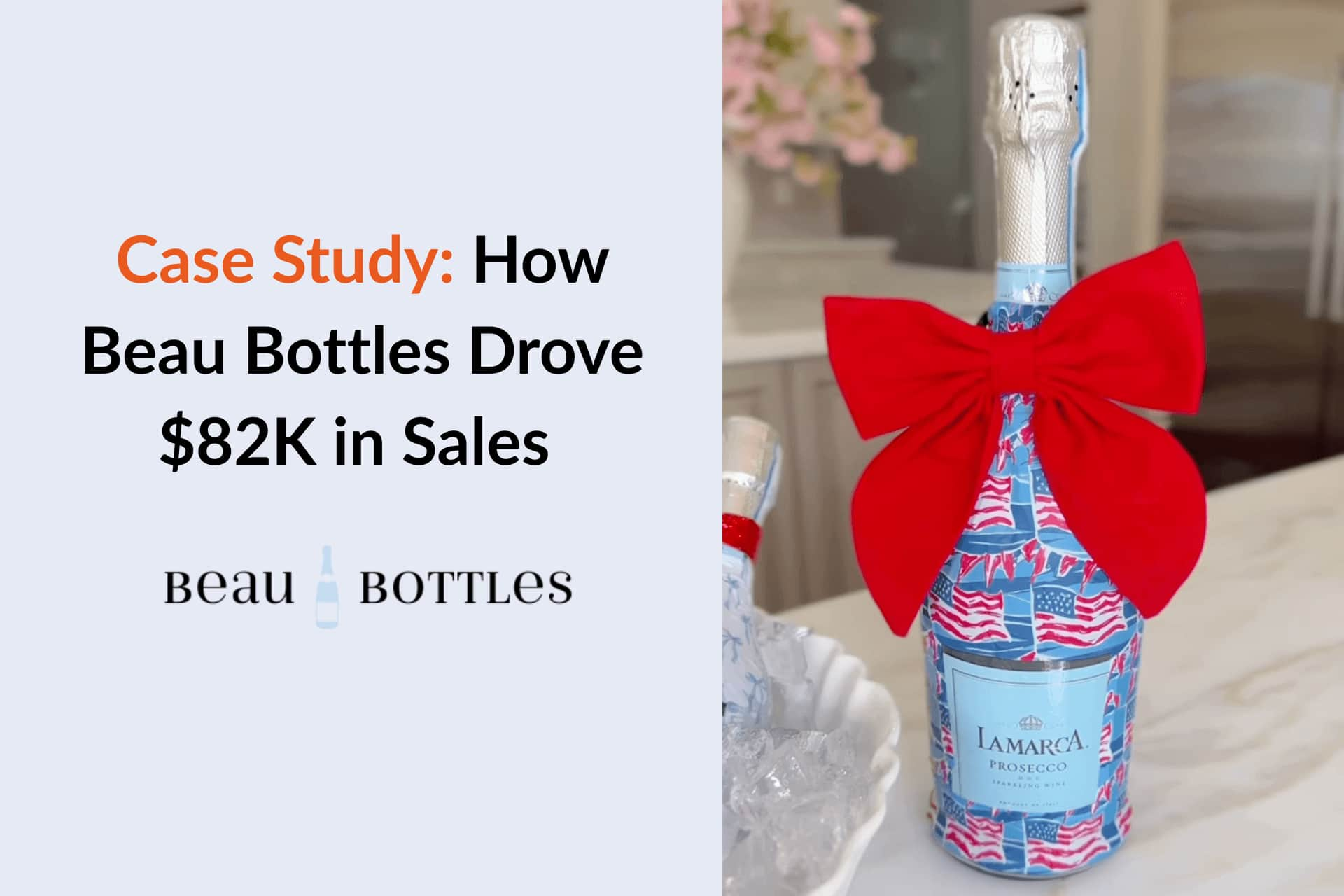





Influencer marketing has become a cornerstone of digital advertising, with platforms like Lionize AI offering streamlined solutions for brands seeking to leverage creator partnerships. However, despite its AI-driven approach, Lionize has faced criticism for issues such as delayed influencer payments, lack of transparency in campaign performance, and limited customization options. These concerns have led many marketers to seek alternative platforms that better align with their needs.
In this article, we'll explore ten leading influencer marketing platforms that provide comprehensive solutions for brands and agencies. Each platform offers unique features and pricing structures to cater to diverse marketing strategies.
Here are the top 10 Lionize alternatives we’ll explore:
Let’s discover four reasons why some users might be seeking Lionize alternatives:
Several users highlight that Lionize relies heavily on mass email outreach to influencers, rather than fostering strong, direct relationships. This approach often results in shallow connections, making it harder for brands to build long-term partnerships and authentic collaborations.
Brands report gaps in Lionize’s campaign management and budget tracking tools. Marketers looking for budget control or advanced workflow automation often find the platform lacking, forcing them to rely on manual tracking or external tools.
Feedback suggests Lionize is less effective when working with bigger celebrity influencers or large-scale campaigns. The platform appears better suited for micro and mid-tier creators, which can limit growth for brands aiming at top-tier partnerships.
Long-term users have expressed disappointment with Lionize’s newer subscription approach. What once delivered frequent, well-paid collaborations now results in fewer opportunities, leaving many marketers feeling the value no longer justifies the cost.
Our comparison focuses on several key aspects:
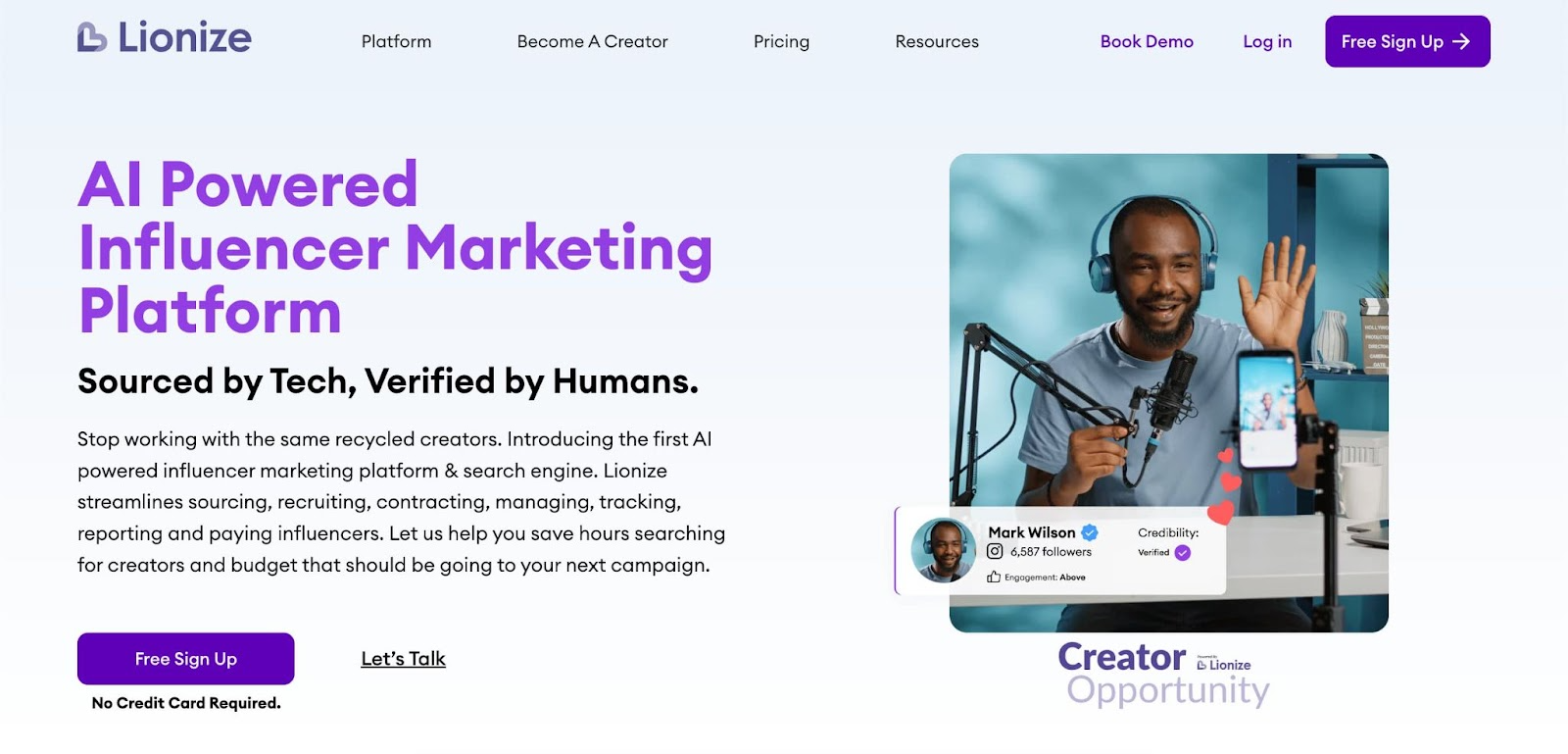
Platform Coverage: Instagram, TikTok, YouTube, and Facebook.
Best For: Mid-size to enterprise brands, particularly eCommerce businesses and consumer-focused companies looking to run data-driven influencer campaigns at scale.
Pricing: Lionize AI offers two main plans. Boost provides automatic AI recruitment, advanced influencer search, expedited onboarding, and access to a dedicated team of strategists. Managed Service is a fully outsourced solution where the Lionize team handles strategy, creator communication, campaign execution, and optimization. Pricing is not transparently listed on the website.
Reviews: 3.4 / 5.0 (G2)
Ease of Use (UX/UI): Users find Lionize AI’s interface clean and straightforward for setting up campaigns. However, many mention a learning curve with advanced reporting and integrations.
Customer Support: Customer support is generally described as responsive, especially during onboarding. Still, some users report slower follow-ups for technical issues and limited live support.

Platform Coverage: Instagram, TikTok, YouTube, Facebook, Pinterest, Snapchat, X, Twitch
Best For: D2C and eCommerce brands on platforms like Shopify and WooCommerce that want to scale influencer campaigns with automation, real-time insights, and multi-platform support. It’s also a strong fit for agencies managing large-scale campaigns who need efficiency and ROI-driven tracking.
Pricing: (Plans are monthly and scalable.)
Reviews: 5.0 / 5.0 (Capterra)
Ease of Use (UX/UI): Influencer Hero is known for its intuitive design and user-friendly interface, with a streamlined dashboard and drag-and-drop workflows. Automated processes and customizable email templates make campaign management fast and efficient, even for non-technical teams.
Customer Support: Customer support is one of Influencer Hero’s strongest assets, offering 24/7 real-human live chat, fast-response email, and a rich Help Center with step-by-step guides and tutorials. Every plan includes a dedicated account manager, with Pro plan users also gaining access to a private Slack channel for continuous support and optional strategy consultations.
While Lionize AI offers a simplified influencer marketing solution with two plans (Boost and Managed Service), it lacks transparent pricing and has fewer customization options. Influencer Hero, in contrast, provides clear, scalable pricing tiers starting at $649/month, with flexibility for both growing brands and agencies.
Lionize is praised for its AI-driven influencer matching, but users often mention frustrations with payments and limited reporting transparency. Influencer Hero outshines here by delivering advanced analytics, seamless eCommerce integrations, and a robust CRM purpose-built for large-scale seeding campaigns. Combined with premium 24/7 customer support and educational resources, Influencer Hero positions itself as a more reliable, scalable, and user-friendly alternative.
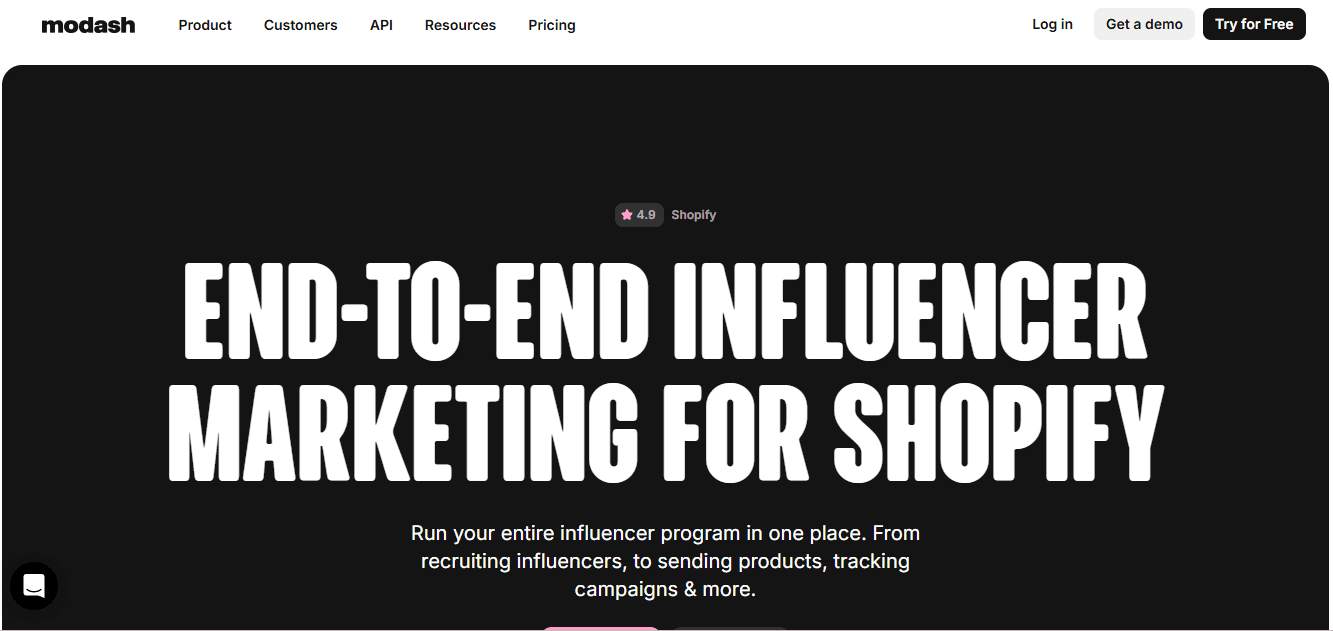
Platform Coverage: Instagram, TikTok, YouTube, and profile recognition for X, Snapchat, and other platforms.
Best For: Consumer brands and small to mid-size marketing teams aiming to scale influencer campaigns with rich data discovery and efficient relationship management across Instagram, TikTok, and YouTube.
Discover our ranking of the top alternatives to Modash, evaluating features, pricing, and reviews, to help you find the perfect influencer marketing tool
Pricing: Modash offers free trials to both their Essentials and Performance plan.
Reviews: 4.9 / 5.0(Capterra.com)
Ease of Use (UX/UI): Users consistently praise Modash for its intuitive, clean interface and powerful search filters that simplify influencer discovery and campaign setup. However, advanced analytics and demographic insights can pose a learning curve for new users.
Customer Support: Modash offers fast, responsive support, with users appreciating built-in help desk support and thorough onboarding assistance.
Lionize AI emphasizes two-tier plans (Boost and Managed Service), with AI-driven influencer matching and campaign simplicity, but lacks proactive features like public pricing transparency and robust analytics depth.
In contrast, Modash offers tiered plans starting at Essentials ($299/month; $199 if billed annually) and Performance ($599/month; $499 annually) with clearly outlined capabilities and generous trial flexibility. Its strength lies in its massive creator database, live content capture, advanced filters, and payment workflows, ideal for teams focused on discovery, campaign optimization, and scalable influencer operations.
While Lionize AI is simpler to navigate and includes bundled strategist support, Modash provides deeper analytics, discoverability, and transparency with flexible self-service options. For brands prioritizing precision, scalability, and control, Modash represents a stronger choice, especially when transparent pricing and robust content tracking are critical.

Platform Coverage: Instagram, TikTok, YouTube, X , Twitch, Pinterest, WordPress blogs.
Best For: D2C and eCommerce brands looking to scale both influencer and affiliate campaigns with an all-in-one solution. It also suits agencies and larger marketing teams seeking robust CRM, campaign automation, and affiliate tracking.
Pricing: Upfluence offers annual contracts with the following pricing.
Reviews: 4.6 / 5.0 (G2)
Ease of Use (UX/UI): Users often describe Upfluence’s interface as intuitive and efficient, particularly appreciating clear campaign workflows and easy navigation. That said, some point out a steep learning curve for advanced features and occasional interface complexity.
Customer Support: Many users praise the dedicated onboarding and responsive support, especially helpful during setup and campaign management.
Lionize AI presents a simpler, streamlined interface with two service tiers targeting mid-size to enterprise brands. However, it lacks transparent pricing and comprehensive campaign management tools. In contrast, Upfluence offers a broader feature set, though with a higher cost.
While Lionize may appeal to brands needing a hands-off, strategist-supported solution, Upfluence hubs into self-service flexibility and full campaign control, especially for brands that care about affiliate performance, influencer ROI, and rich automation. Brands should choose based on whether they value simplicity and support (Lionize) or depth, transparency, and autonomy (Upfluence).
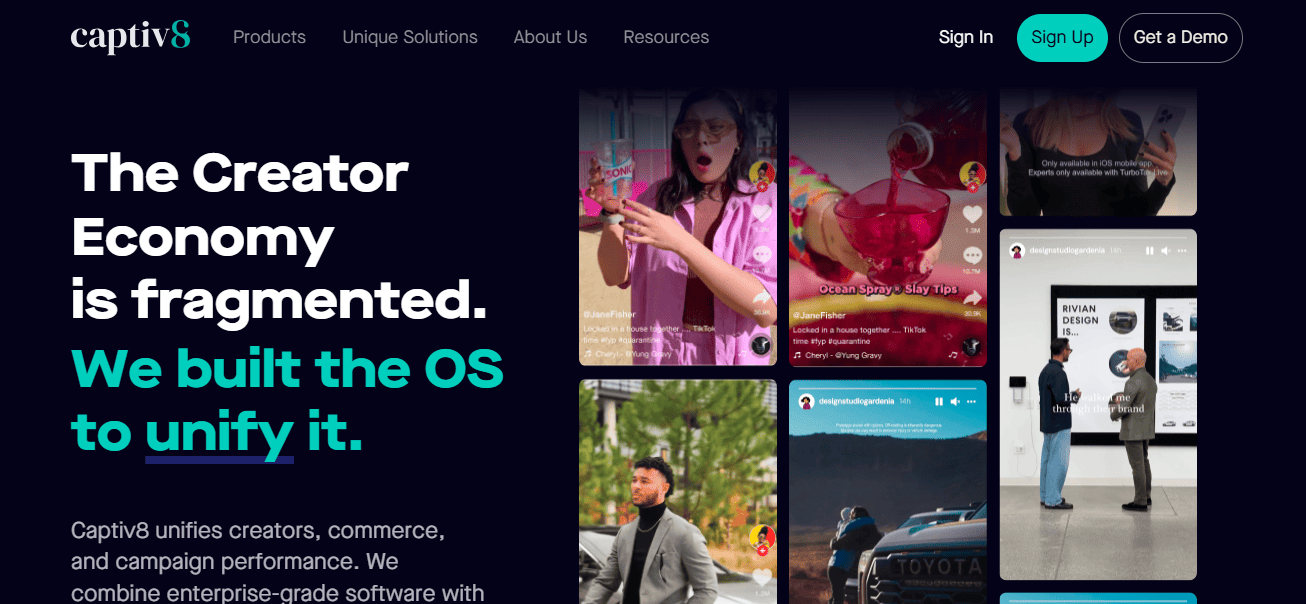
Platform Coverage: Captiv8 supports influencer campaigns across Instagram, YouTube, TikTok, Facebook, Twitter, and Pinterest.
Best For: Large brands and agencies aiming to launch enterprise-grade influencer marketing and social commerce campaigns with AI-powered insights and commerce integrations.
Pricing:
No monthly or customizable plans are available; pricing is rigid and enterprise-focused
Reviews: 4.6 / 5.0 (G2)
Ease of Use (UX/UI): Users often report that Captiv8 delivers a unified, intuitive interface praised for ease of use and seamless setup, a recognition supported by G2 with top rankings in usability and implementation.
Customer Support: Brands value Captiv8's award-winning service and strategic support that help execute campaigns with confidence across global markets.
Captiv8 positions itself as an enterprise-grade influencer marketing platform, recognized for delivering robust analytics, commerce integrations, AI-driven discovery, and brand safety tools. It commands higher pricing and semi-annual commitments, which aligns with its service depth.
Lionize AI, by comparison, caters more to mid-size brands with simpler needs through two service tiers but lacks transparent pricing and deep attribution tools. Its approach relies more on AI matching and strategist support, with fewer e-commerce integrations and less granular analytics. Influencer Hero offers a more flexible and cost-effective alternative with similar campaign controls at lower entry pricing.
Choosing between the two depends on your scale and sophistication:
Captiv8 excels at enterprise-level, full-funnel creator marketing with deep data integration, while Lionize AI is suited to teams seeking simplicity and strategist collaboration without the heavy price tag.
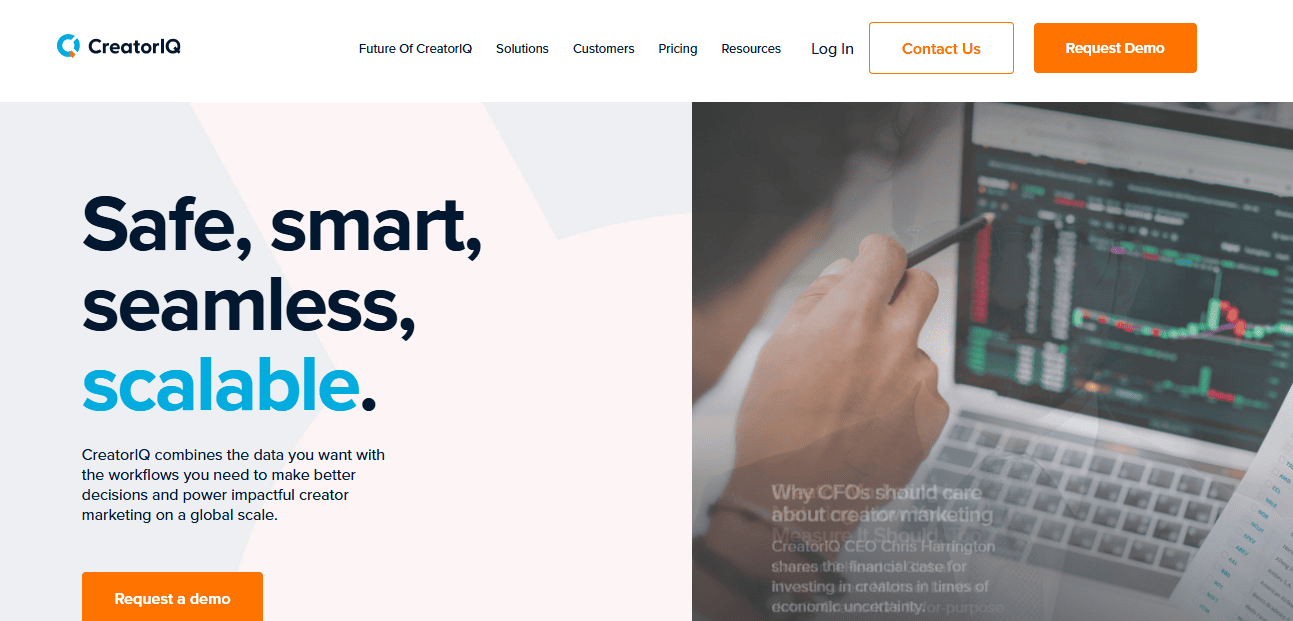
Platform Coverage: Instagram, TikTok, YouTube, Facebook, Pinterest, Twitch, X.
Best For: Enterprise brands and agencies managing large-scale influencer programs across multiple regions. With strong API integrations and trusted global clients, it’s designed for teams needing full lifecycle management.
Pricing: All plans are billed annually.
Reviews: 4.6 / 5.0 (G2)
Ease of Use (UX/UI): Users find CreatorIQ powerful but note that its breadth of features can be overwhelming for smaller teams. The customizable dashboards and live reporting links are highly praised for executive-friendly presentation.
Discover our guide to the top 10 CreatorIQ alternatives to elevate your influencer marketing strategy and unlock better performance and usability.
Customer Support: CreatorIQ is known for its strong support with dedicated implementation and customer success managers. Clients value the strategic guidance provided for onboarding, planning, and scaling campaigns.
Lionize AI focuses on simplifying influencer marketing with two service tiers (Boost and Managed Service), offering AI-driven matching but with limited customization and transparency in pricing. Its straightforward approach appeals to mid-size brands but lacks scalability for enterprises.
CreatorIQ, on the other hand, is built for enterprise-scale campaigns with advanced API integrations, customizable analytics, and robust CRM capabilities. Pricing is significantly higher (starting at $35,000/year), but it includes strategic guidance and compliance features that Lionize does not provide.
For brands that need simplicity and hands-on strategist support at a lower entry point, Lionize may suffice. However, CreatorIQ is the stronger option for enterprises that demand precision, compliance, and full lifecycle influencer management with advanced analytics.
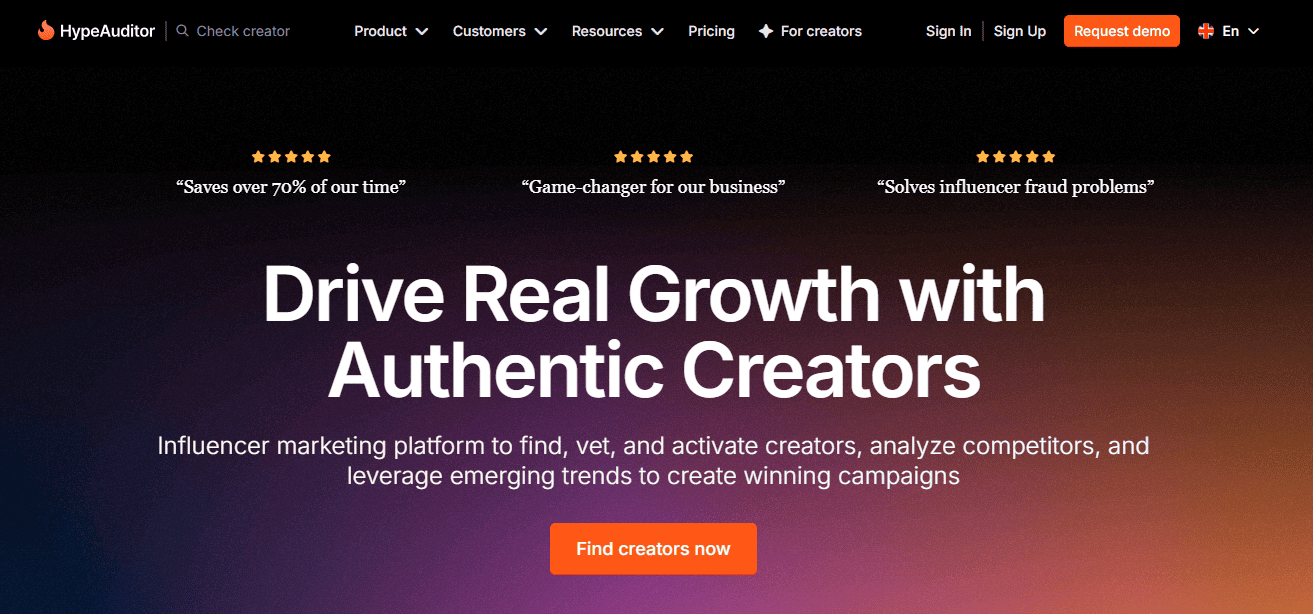
Platform Coverage: Instagram, TikTok, YouTube, Twitch, X (Twitter), Snapchat
Best For: Brands and agencies that want a strong focus on fraud detection, audience authenticity, and influencer analytics to ensure ROI on campaigns. It’s a solid choice for companies investing heavily in data-driven influencer selection and eCommerce campaign tracking.
Pricing: Custom plans based on usage. Flexible contract terms depending on platform access, campaign volume, and number of reports.
Reviews: 4.5 / 5.0 (G2)
Ease of Use (UX/UI): Users say HypeAuditor’s dashboards and reporting are clean and detailed, with advanced filtering tools making it easier to find niche influencers. Some note that the system can feel complex at first and requires onboarding to unlock its full potential.
Customer Support: Customers highlight responsive onboarding and support during setup, with training available for teams managing multiple campaigns. A few reviews mention slower assistance when dealing with advanced campaign troubleshooting.
Lionize AI simplifies influencer discovery and campaign management with its Boost and Managed Service tiers, but it struggles with transparency in pricing, customization, and influencer payment issues. Its focus is on providing straightforward AI-driven matching with strategist support.
HypeAuditor, by contrast, offers deeper discovery with advanced fraud detection, social listening, and competitor analysis. It’s built for brands that want data accuracy and ROI insights, though it comes at a higher cost, starting around $10,000 per year.
For smaller or mid-sized brands seeking simplicity and a managed experience, Lionize may feel more accessible. But for companies that prioritize analytics, fraud detection, and scalable reporting across multiple platforms, HypeAuditor delivers far greater depth and accuracy.
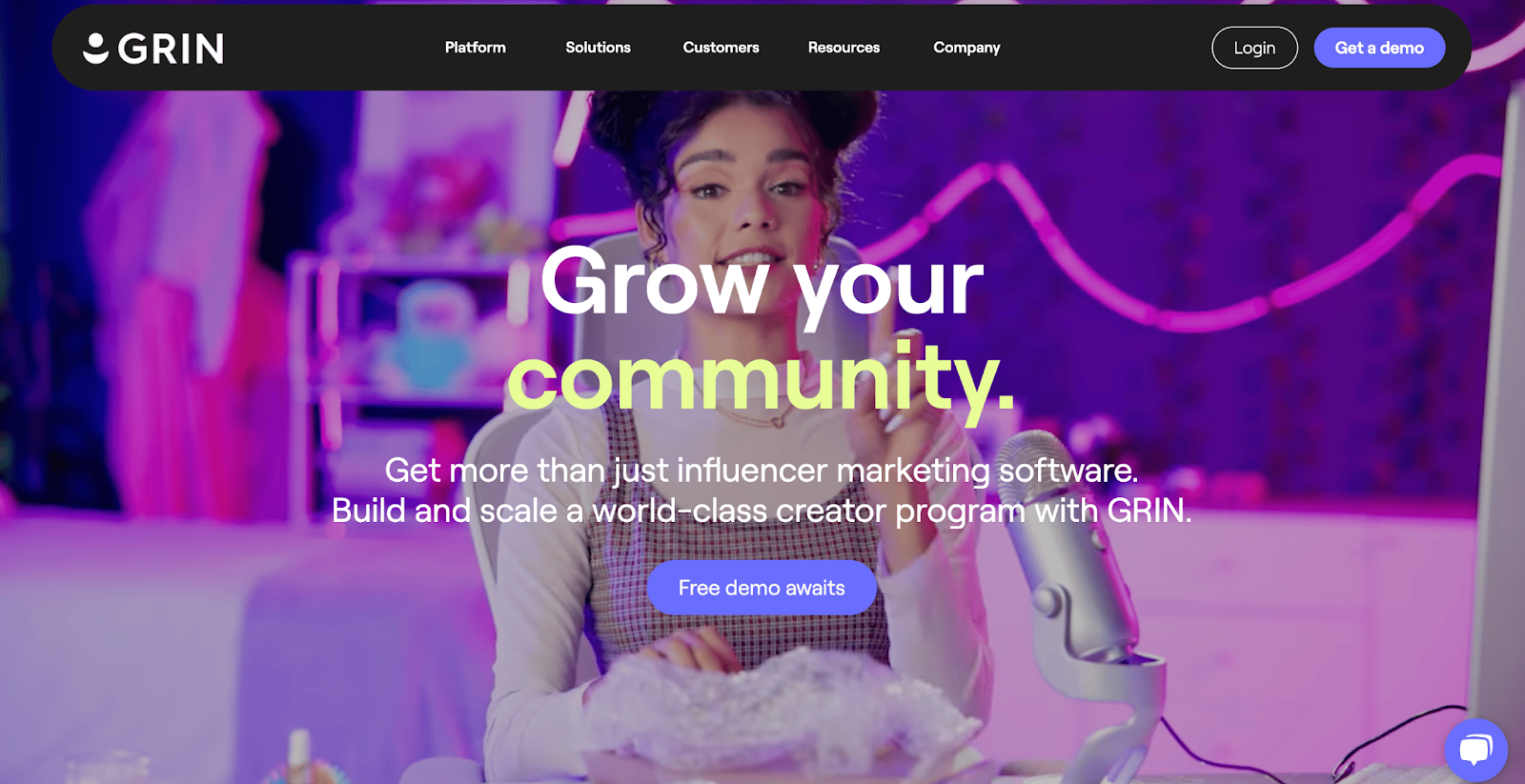
Platform Coverage: Instagram, TikTok, YouTube, X, Twitch, Snapchat
Best For: eCommerce and DTC brands looking for an all-in-one platform to manage influencer campaigns, from product seeding and gifting to affiliate tracking, payments, and UGC collection, integrated directly with their online stores.
Pricing: Plans start at $25,000 per year, with monthly payments available and a required 12-month commitment; typical monthly costs range from $2,500 to over $10,000 depending on usage, though pricing transparency may vary based on selected features.
Reviews: 4.5 / 5.0 (G2)
Discover our breakdown of 10 standout GRIN alternatives, highlighting features, affordability, and user experience, to optimize your influencer marketing strategy.
Ease of Use (UX/UI): Users note GRIN’s interface is intuitive, with clear workflows for discovery, outreach, and gifting. Some mention performance glitches and slow loading times, but overall the platform is praised for being comprehensive once mastered.
Customer Support: GRIN offers onboarding and optional strategist support, which many brands find helpful. However, some users report inconsistent follow-through on tickets and delays in resolving technical issues.
GRIN is designed for eCommerce and DTC brands with a strong focus on end-to-end campaign management, offering robust eCommerce integrations, affiliate tracking, and UGC collection.
Lionize, on the other hand, emphasizes AI-powered discovery and simplified workflows, making it appealing to mid-sized brands that want automation but don’t necessarily need deep commerce integrations.
When it comes to pricing, GRIN’s costs are more transparent but steep, typically starting around $2,500 per month with a 12-month contract. Lionize does not disclose pricing publicly, but positions itself as offering flexible plans like Boost and Managed Service. This lack of transparency can be frustrating, though some businesses may find its pricing more accessible depending on the level of service chosen.
Ultimately, brands should choose GRIN if they need a comprehensive, eCommerce-native platform with strong ROI tracking and UGC tools, and can justify the higher cost. Lionize may be better for companies seeking simpler campaign automation and AI-driven discovery without committing to GRIN’s pricing model.

Platform Coverage: Facebook, Instagram, TikTok.
Best For: Brands of all sizes, especially eCommerce and consumer-focused companies, that want to leverage AI to match with influencers across multiple platforms and manage scalable campaigns globally.
Pricing: Undisclosed
Reviews: 4.4 / 5.0 (G2)
Ease of Use (UX/UI): Users find the platform intuitive and straightforward, with AI-driven tools making influencer discovery easier. However, some reviews mention the interface can feel unintuitive at times, leading to a learning curve.
Customer Support: Atisfyreach provides support via a Help Center and is generally rated positively on Trustpilot. Still, users have reported delays in responses and limited support channels, especially for technical issues.
While both Lionize and Atisfyreach leverage AI for influencer discovery and campaign management, they differ in focus and execution.
Lionize positions itself as a scalable solution for mid-size to enterprise brands with features like AI recruitment, automated outreach, and advanced analytics. Atisfyreach, on the other hand, emphasizes global reach and a matchmaking system powered by real-time algorithms, making it appealing for brands seeking international campaigns.
In terms of pricing, neither Lionize or Atisfyreach share transparent costs publicly. This lack of transparency on both sides can make cost evaluation challenging, though Lionize is often seen as more service-heavy, while Atisfyreach leans on automation and AI-driven efficiencies.

Platform Coverage: Instagram, TikTok, YouTube (including Shorts), and Twitch.
Best For: Designed for mid-to-large influencer marketing teams that require advanced, data-driven insights across multiple channels. Especially valuable for teams leveraging AI tools to streamline workflows and boost audience engagement.
Pricing: Monthly billing with a one-year minimum contract.
Reviews: 4.6 / 5.0 (G2)
Ease of Use (UX/UI): Users appreciate its straightforward, clean interface that simplifies creator analysis and campaign monitoring. The platform is considered beginner-friendly, requiring minimal onboarding.
Customer Support: Infludata offers timely assistance through live chat and email, complemented by a library of resources including webinars, guides, and FAQs. Higher-tier plans feature personalized onboarding and dedicated support.
Check out our updated breakdown of the top 10 influData alternatives, featuring standout platforms ideal for teams prioritizing both discovery depth and seamless execution.
Lionize appeals to mid-sized and enterprise eCommerce brands looking for an accessible entry point into influencer marketing, with tools for influencer matching, CRM management, and UGC repurposing.
Infludata, on the other hand, targets larger teams needing deep, data-driven insights across multiple platforms, offering features like AI lookalike modeling, fake follower detection, and advanced analytics that provide greater campaign precision.
When comparing usability and support, Lionize is often recognized for its clean onboarding and straightforward campaign setup, though some users report challenges with payments and limited customization. Infludata is praised for its polished UX, comprehensive reporting, and strong support resources, but it requires rigid annual contracts and comes with higher pricing tiers. Ultimately, Lionize provides a solid foundation for teams that want simplicity and automation, while Infludata is a stronger fit for organizations prioritizing analytics depth, fraud detection, and enterprise-level scalability.

Platform Coverage: Instagram, TikTok, YouTube.
Best For: Mid-to-large brands looking for AI-powered campaign automation, predictive ROI scoring, and end-to-end cross-channel campaign management. Particularly appealing for Shopify brands aiming to link influencer efforts directly to sales.
Pricing:
Reviews: 4.2 / 5.0 (G2)
Ease of Use (UX/UI): The Cirqle provides a modern, data-focused interface designed for efficiency and automation. While some features require training, once set up, it supports smooth campaign scaling.
Customer Support: Premium-tier clients get priority support and 24/7 availability. Standard users rely on ticket-based service. Some influencers mention slower communication and delayed payments during campaigns.
Lionize focuses on providing mid-sized and enterprise eCommerce brands with AI-driven influencer discovery, automated outreach, and centralized campaign dashboards, making it attractive for teams seeking efficiency and solid matching accuracy.
The Cirqle, by contrast, is built around advanced automation and predictive ROI insights, with strong integrations into Shopify and Ads Manager, making it a stronger fit for brands that want to connect influencer marketing directly to sales outcomes.
In terms of usability, Lionize offers a clean and straightforward setup process but can present challenges with advanced reporting and scaling complex campaigns. The Cirqle delivers a more analytics-heavy interface designed for automation and efficiency, though it requires more upfront planning and training to unlock its full value.
Overall, Lionize appeals to brands that value accessibility and foundational campaign management, whereas The Cirqle is best for teams seeking deeper automation and ROI-driven campaign execution.
While Lionize has been a popular influencer marketing platform, its limitations in terms of transparency, customization, and handling larger-scale campaigns have led many brands to explore alternatives.
As a Lionize alternative, Influencer Hero stands out with its advanced AI-driven campaign management, influencer discovery, and CRM capabilities, all designed to support eCommerce brands and agencies with large-scale influencer operations.
Other platforms like Modash, Upfluence, and CreatorIQ also provide valuable features such as enhanced analytics and robust influencer databases. However, Influencer Hero's combination of automation, real-time insights, and seamless integrations with eCommerce platforms makes it one of the best Lionize alternatives for brands looking to optimize their influencer marketing efforts.

Some top alternatives include Influencer Hero, Modash, Upfluence, CreatorIQ, and Captiv8. Influencer Hero stands out with AI-powered campaign management, influencer discovery, and eCommerce integrations, making it ideal for scaling influencer efforts.
Yes, Influencer Hero offers clear pricing, advanced AI features, influencer discovery, and seamless integrations with platforms like Shopify, making it a better choice for brands seeking efficiency and scalability over Lionize’s limited customization and transparency.
Look for features like influencer discovery, campaign management, CRM, analytics, and eCommerce integrations. Influencer Hero excels with AI-powered search, automation tools, real-time insights, and easy eCommerce platform integration.
Modash offers better influencer discovery, advanced analytics, and clearer pricing. It’s a strong option for brands looking for control over campaigns, unlike Lionize, which lacks transparency and customization.
Influencer Hero combines AI-driven tools, real-time insights, and robust eCommerce integrations. It stands out with scalable pricing, intuitive features, and premium support, making it ideal for brands looking to scale influencer campaigns efficiently.



Schedule a Demo with one of our media experts below.